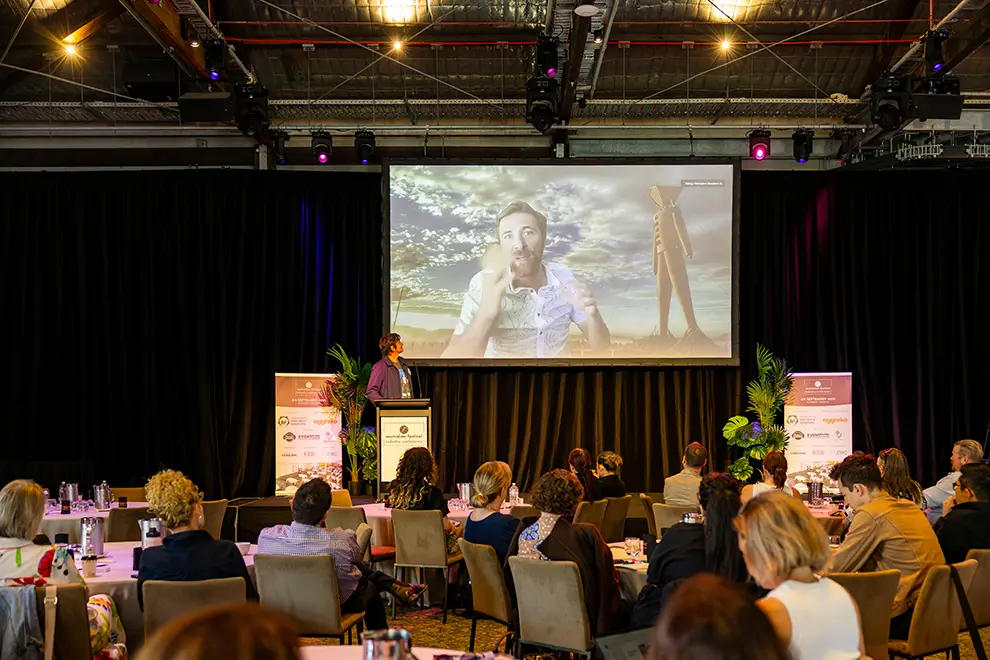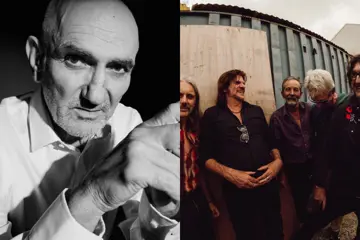Preparing for the upcoming bushfire season for regional festivals, a $1 ticket levy on big events to help struggling grassroots festivals, and how governments can help promoters survive.
These were some of the topics being discussed at the fourth Australian Festival Industry Conference (AFIC) at the Rivershed, Brisbane.
It drew a record 150 attendees from Australia, the UK and New Zealand.
They represented public, private and not-for-profit festival producers, as well as suppliers of equipment, food and drinks, and those representing educational institutions, media and government grant administrators.
The summit was held to discuss challenges and opportunities just as Live Performance Australia released its attendance and revenue report showing contemporary music festivals generated $331.1 million in revenue in 2024, a 6.7% decrease from 2023. Attendance was over 2 million, a 0.9% drop.
Government Moves
Of particular interest to the room was NSW Minister for the Arts, Music and Night-Time Economy John Graham’s talk about the changes
The NSW Government is in the process of making, to reduce operational costs and simplify processes for artists and suppliers.
He prefaced his remarks: "It has been a very challenging time over the past couple of years, post-covid... The loss of Splendour, Falls and Groovin' The Moo, and more, has been devastating for the sector, and it's forced a deep rethink on the shape of this part of this industry going forward.
Don't miss a beat with our FREE daily newsletter
“It's also been one of the areas where we've felt as a Government, we need to intervene. That's why we set up the Music Festivals Viability Fund that has helped the larger music festivals."
Examples of the State Government helping with operating costs for festivals included investing in outdoor electricity to avoid having to hire generators.
Local councils can soon create pre-approved development applications and traffic management plans, cutting average costs by up to 40%.
There’s also a streamlined approvals process for buskers, food van operators, and others with one approval for multiple local government areas.
The Minister added: "We're supporting Councils to invest in permanent traffic management infrastructure, like retractable bollards, so they don't have to hire barriers every time.”
Burning
Also drawing interest to delegates worried about the growing impact on festivals by bushfires and flooding was the keynote by Christopher Breedlove, Director of Civic Activation at the Burning Man Project.
Breedlove recounted the dilemma of record wildfires in 2021, record heat in 2022, hurricane rains in 2023, and 96km/h winds and rain this year. The reality of US festivals is that a number of them have been cancelled or cut short due to the weather, “and we expect that figure to keep rising.”
Burning Man has introduced a number of sustainably-focussed initiatives and tech advancements to enhance its operations and better respond to adverse weather.
The aim is that by the year 2030, Burning Man will have zero waste, carbon negative, regenerative and investing in solar-powered infrastructure and renewable propane toilets.
But why such a target is attainable, Breedlove said, was that in the Burning Man model, the audience decides the issues, and wholeheartedly helping to reach sustainability targets is part of this.
"There is no formal programming at the festival,” he explained. “Rather, the content is left up to the attendees, camp leaders and artists.
“Therefore Burning Man attendees experience constant serendipity. It's never FOMO, but rather, JOMO (Joy Of Missing Out), as they go about their wild and unpredictable time at ‘The Burn.’”
The not-for-profit Burning Man’s philosophy participants created showed that not only is sustainability embedded in the patron experience, but it can also be fun.
That culture and values were essential to the process opened the eyes to some promoters of the need to incorporate more First Nations lifestyles to their offerings.
"One of my favourite quotes is ‘If you build it, they will come,” noted Breedlove. “But if they build it they will stay forever.’ They feel ownership of what they're doing.”
Participation and working together was another theme running through panels and workshops.
It was emphasised by John Rostron, CEO of the UK’s Association of Independent Festivals (AIF).
He set the tone of his keynote by revealing, "In just the last three years, the UK has seen an unprecedented 249 festivals disappear."
Rostron said that having 148 festivals with a total capacity of 1.35 million under the AIF gave them clout when lobbying for changes.
These included simplifying red tape through a “licensing sprint,” and working with the Government to reduce the power of major multi-national players which are taking “ownership” of the £1.7 billion (AU$3.47 billion) industry and putting downward pressure on smaller, independent festivals.
Live Nation’s festivals have a combined audience capacity of 880,000, with Superstruct’s 350,000 and AEG’s 230,000.
According to the AIF, the UK has four major festivals with a capacity of 80,000 and over. Live Nation owns three. The other is Glastonbury, at which Melvin Benn of Festival Republic (Live Nation) has a director position.
The AIF is also pushing for a number of initiatives to ease the pressures independent festivals are facing.
These include the LIVE Trust offering funding for the grassroots, a Music Festival Tax Relief to help those under a 30,000 capacity, and a Fallow Festival Fund offering free AIF membership for 12 months.
Ticket Levy
Rostron’s presentation also put the spotlight on the ticket levy on major players to pass on to struggling grassroots owners. The UK levy is £1. France has gone past a voluntary offering to make it law that a 3.5% levy be applied. The idea is taking hold in Germany, the Netherlands, Spain and Canada.
The long time push in Australia by associations – including the Australian Live Business Council, the Association of Artist Managers, APRA and the Australian Road Crews Association – saw the launch in March of the Australian Music Venue Foundation (AMVF) pushing for a $1.10 levy on events over 5,000-capacity.
Although the idea is being opposed in many quarters, it is slowly being accepted. In June, The Music reported the Sooki Lounge became the first Australian venue to charge customers a $1 levy. Olivia Dean’s 2026 Australian tour includes a $1.10 per ticket contribution to the AMVF.
The push is met with excitement by the Australian Centre for Regional Events – “major metro events helping sustain smaller regional ones” – is about to make an announcement on a new initiative.
Over two days, the AFC featured two keynotes, 20 presentations, four panel discussions, a Q&A chat, a trade exhibition and two networking events.
Founder and Event Director, Carlina Ericson, said that she couldn’t have asked for a better result.
“The feedback throughout the conference was overwhelmingly positive and I was inundated with people expressing how useful they found the content and the abundance of networking opportunities.”
This piece of content has been assisted by the Australian Government through Music Australia and Creative Australia, its arts funding and advisory body

















